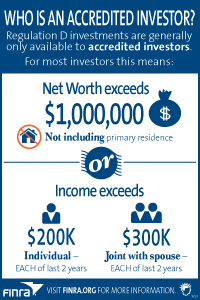 Every year, companies across the United States raise hundreds of billions of dollars selling securities in non-public offerings that are exempt from registration under the federal securities laws. These offerings, known as private placements, can be a tremendous source of capital for both small and large business. However, according to FINRA, investors should be aware that private placements can be illiquid and are very risky with the potential to lose most or all of your investment.
Every year, companies across the United States raise hundreds of billions of dollars selling securities in non-public offerings that are exempt from registration under the federal securities laws. These offerings, known as private placements, can be a tremendous source of capital for both small and large business. However, according to FINRA, investors should be aware that private placements can be illiquid and are very risky with the potential to lose most or all of your investment.
Fraud and Sales Practices Abuses
For over three years, FINRA has been investigating private placements and has uncovered fraud and sales practice abuses related to private placements that resulted in sanctions of individual brokers and financial institutions for providing investors inaccurate information relating to private placements. In addition, some materials omitted information necessary for investors to make informed investment decisions. Finally some firms failed to conduct adequate investigations into whether the private placements were suitable for customers.
What is a Private Placement?
According to FINRA, a private placement is an offering of a company’s securities that is not registered with the Securities and Exchange Commission (SEC) and is not offered to the public generally.
Many private placements are offered pursuant to Regulation D of the Securities Act of 1933, which details the amount of money a company case raise and the guidelines for investor participation and solicitation.
If you are considering investing in a private placement, you should know that there is usually limited information about the issuer and the management of the private placement. The offering materials, which generally includes a private placement memorandum or term sheet), generally contains limited information about the private placement making it difficult for some investors to understand the investment and to track its performance.
Who Can Invest in Private Placements?
Generally, only “accredited investors” can invest in private placements. Accredited investors generally have a net worth (excluding primary residence) of over $1 million either with a spouse or alone; or the investor must have an income exceeding $200,000 over each of the last two years or $300,000 with a spouse. It is important to note that along with the income requirement, there must be an expectation that the investor will earn the same amount over the current year at least.
Its important to note that sometimes private placements are offered to investors that are not accredited.
General Solicitation of Regulation D Private Placement Offerings
In the past, companies claiming exemptions under Regulation D could not engage in general solicitation or general advertising materials to market the private placement. The 2012 JOBS Act however, changed the rules. In accordance with the JOBS Act, the SEC starting September 23, 2013 now allows companies to conduct general solicitation and advertising for Regulation D Rule 506 private securities offerings. This may lead to the sale of private placements
While the target audience will be accredited investors, the reality is that all investors—whether accredited or not—will likely be exposed to private placement sales pitches and advertising, for instance by Regulation D crowdfunding platforms. This will lead to the investment in private placements by many non-accredited investors and will expose many investors to risks they do not understand.
Review these tips to determine if Private Placements are Right for You.
Follow these tips to determine if a private placement investment is right for you.
- Stay informed. Find out everything you can about the investment. Most importantly, find out if the investment is illiquid and how long it may remain illiquid before you invest.
- Talk to your broker. Ask your broker about risk, about the investment, ask your broker to provide you all the written material available on the investment, ask whether the investment fits with your stated investment objectives, and most importantly ask about the risks associated with the investment.
- Review all documents carefully. Read the private placement memorandum, the term sheet, and any marketing materials.
- Review all publicly available information on the SEC’s website. Go to the SEC’s website and review all publicly available information like Form 4’s and all other documents you can find.
Additional Resources for Understanding Private Placements
- Gana Weinstein LLP describes Private Placements
- FINRA Regulatory Notice 10-22, Obligation of Broker-Dealers to Conduct Reasonable Investigations in Regulation D Offerings
- FINRA News Release, FINRA Sanctions Two Firms and Seven Individuals for Selling Private Placements Without Conducting a Reasonable Investigation
- SEC News Release: SEC Approves JOBS Act Requirement to Lift General Solicitation Ban
- FINRA News Release, FINRA Sanctions Eight Firms and 10 Individuals for Selling Interests in Troubled Private Placements, Including Medical Capital, Provident Royalties and DBSI, Without Conducting a Reasonable Investigation
- FINRA Regulatory Notice 12-40, Private Placements of Securities, SEC Approves New FINRA Rule 5123 Regarding Private Placements of Securities
- North American Securities Administrators Association, Private Placements
The attorneys at Gana Weinstein LLP has been Investing the Suitability of Private Placements for almost almost a decade. If you believe that you were improperly recommended a private placement contact us.
 Securities Lawyers Blog
Securities Lawyers Blog

